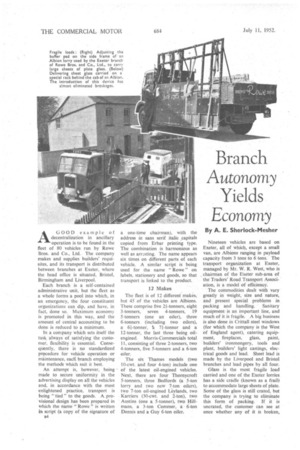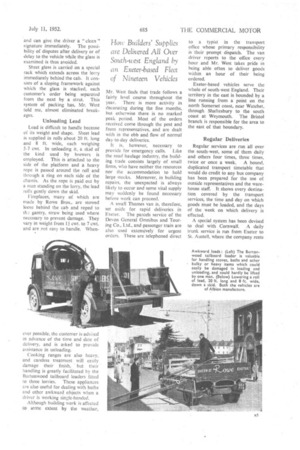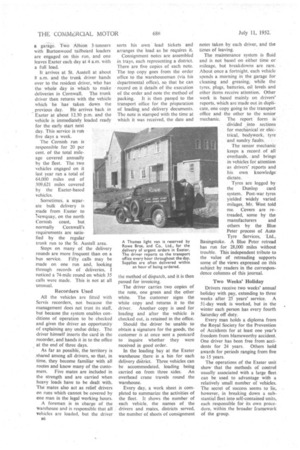Branch Autonomy Yields Economy
Page 38

Page 39

Page 40

If you've noticed an error in this article please click here to report it so we can fix it.
By A. E. Sheriock-Mesher AGOOD example of decentralization in ancillary operation is to be found in the fleet of 80 vehicles run by Rowe Bros. and Co., Ltd. The company makes and supplies builders' requisites, and its transport is distributed between branches at Exeter, where the head office is situated, Bristol, Birmingham and Liverpool.
Each branch is a self-contained administrative unit, but the -fleet as a whole forms a pool into which, in an emergency, the four constituent organizations can dip, and have, in fact, done so. Maximum economy is promoted in this way, and the amount of central accounting to be done is reduced to a minimum.
In a company which sets itself the task always of satisfying the customer, flexibility is essential. Consequently, there is no standardized procedure for vehicle operation or maintenance, eaeli branch employing the methods which suit it best.
An attempt is, however, being made to secure uniformity in the advertising display on all the vehicles and, in accordance with the most enlightened practice, transport is being " tied " to the goods. A provisional design has been prepared in which the name "Rowe is written in script (a copy of the signature of a one-time chairman), with the address in sans serif italic ,capitals copied from Erbar printing type. The combination is harmonious as well as arralting. The name appears six times on different parts of each vehicle. A similar script is being used for the name " Rowe " on labels, stationery and goods, so that transport is linked to the product.
12 Makes The fleet is of 12 different makes, but 45 of the vehicles are Albions. These comprise five 21-tonners, eight 3-tonners,seven 4-tonners, 19 5-tormers (one an oiler), three 6-tonners (including two oilers), a 61-tormer, a 71-tonner and a 12-tonner, the last three being oilengined. Morris-Commercials total 11, consisting of three 2-tonners, two 4-tonners, five 5-tonners and a 6-ton oiler.
The six Thames models (two 10-cwt. and four 4-ton) include one of the latest oil-engined vehicles. Next, there are four Thornycroft 5-tonners, three Bed fords (a 5-ton lorry and two new 7-ton oilers), two 7-ton oil-engined Leylands, two Karriers (30-cwt. and 2-ton), two Austins (one 4 5-tonner), two Hillmans, a 3-ton Commer, a 6-ton Dennis and a Guy 6-ton oiler.
Nineteen vehicles are based on Exeter, all of which, except a small van, are Albions ranging in payload capacity from 3 tons to 6 tons. The transport organization at Exeter, managed by Mr. W. R. West, who is chairman of the Exeter sub-area of the Traders' Road Transport Association, is a model of efficiency.
The commodities dealt with vary greatly in weight, size and nature, and present special problems in packing and handling. Sanitary equipment, is an important line, and much of it is fragile. A big business is also done in Crittall steel windows (for which the company is the West of England agent), catering equipment, fireplaces, glass, paint, builders' ironmongery, tools and plant, builders' light castings, electrical goods and lead. Sheet lead is made by the Liverpool and Bristol branches and lead pipes by all four.
Glass is the most fragile load carried and one of the Exeter lorries has a side cradle (known as a frail) to accommodate large sheets of plate. Some of the glass is still crated, but the company is trying to eliminate this form of packing. If it is uncrated, the customer can see at once whether any of it is broken, and can give. the driver a " clean " signature immediately. The possibility of disputes after delivery or of delay to the vehicle while the glass is examined is thus avoided.
Sheet glass is carried on a special rack which extends across the lorry immediately behind the cab. It consists of a sloping framework against which the glass is stacked, each customer's order being separated from the next by a strut. This system of packing has, Mr. West told me, almost eliminated breakages.
Unloading Lead Lead is difficult to handle because of its weight and shape. Sheet lead is supplied in rolls about 20 ft. long and 8 ft. wide, each weighing 5-7 cwt. In unloading it, a skid of the kind used by brewers is employed. This is attached to the side of the platform and a heavy rope is passed around the roll and through a ring on each side of the chassis. As the rope is paid. out by a man standing on the lorry, the lead rolls gently down the skid.
Fireplaces, many of which are made by Rowe Bros., are stowed loose behind the cab and roped to th.. gantry, straw being used where necessary to prevent damage. They vary in weight from 11 cwt. to 7 cwt. and are not easy to handle. When
ever possible, the customer is advised in advance of the time and date of delivery, and is asked to provide assistance in unloading.
Cooking ranges are also heavy, and careless treatment will easily . damage their finish, but their handling is greatly facilitated by the Burtonwood tailboard loaders fitted
to three lorries. These appliances are also useful for dealing with baths and other awkward objects when a driver is working single-handed.
Although building work is affected to some extent by the weather, Mr. West finds that trade follows a fairly level course throughout the year. There is more activity in decorating during the fine months, but otherwise there is no marked peak period. Most of the orders received come through the post and from representatives, and are dealt with in the ebb and flow of normal day-to-day deliveries.
11 is, however, necessary to provide for emergency calls. Like the road haulage industry, the building trade consists largely of small firms, who have neither the resources nor the accommodation to hold large stocks. Moreover, in building repairs, the unexpected is always likely to occur and some vital supply may suddenly be found necessary before wcrk can proceed.
A small Thames van is, therefore, set aside for rapid deliveries in Exeter. The parcels service of the Devon General Omnibus and Touring Co., Ltd., and passenger train are also used extensively for urgent orders. These are telephoned direct to a typist in the transport office whose primary responsibility is their prompt dispatch. The van driver reports to the office every hour and Mr. West takes pride in being able often to deliver goods within an hour of their being ordered.
Exeter-based vehicles serve the whole of south-west England. Their territory in the east is bounded by a line running from a point on the north Somerset coast, near Watcher, through Shaftesbury to the south coast at Weymouth. The Bristol branch is responsible for the area to the east of that boundary.
Regular Deliveries
Regular services are run all over the south-west, some of them daily and others four times, three times, twice or once a week. A bound, duplicated transport timetable that would do credit to any bus company has been prepared for the use of outside representatives and the warehouse staff. It shows every destination covered by the transport services, the time and day on which goods must be loaded, and the days of the week on which delivery is effected.
A special system has been devised to deal with Cornwall. A daily trunk service is run from Exeter to St. Austell, where the company rents
a garage. Two 'Albion 3-tonners with Burtonwood .tailboard loaders are engaged on this run, and one leaves Exeter each day at 4 a.m. with a full load.
It arrives at St. Austell at about 8 a.m. and the trunk driver hands over to the resident driver, who has the whciie day in which to make deliveries in Cornwall. The trunk driver then returns with the vehicle which he has taken down the previous day. He arrives back in Exeter at about 12.30 p.m. and the vehicle is immediately loaded ready for the early start next day. This service is ruts five days a week.
The Cornish run is responsible for 20 per cent. of the total mileage covered annually by the fleet. The two vehicles engaged on it last year ran a total of 64,000 miles out of 309,621 miles covered by the Exeter-based vehicles.
Sometimes, a separ. ate bulk delivery is made from Exeter to !Newquay, on the north Cornish coast, but normally Cornwall's requirements are satisfied by the regular trunk run to the St. Austell area.
Stops on many of the delivery rounds are more frequent than on a bus service. Fifty calls may be made on one run and, looking through records of deliveries, I noticed a 74-mile round on which 35 calls were made. This is not at all unusual.
Recorders Used All the vehicles are fitted with Servis recorders, not because the management does not trust its staff, but because the system enables conditions of operation to be checked and gives the driver an opportunity of explaining any undue delay. The driver himself inserts the card in the recorder, and hands it in to the office at the end of three days.
As far as possible, the territory is .shared among all drivers, so that, in time, they become familiar with all routes and know many of the customers. Five mates are included in the strength and are carried when heavy loads have to be dealt with. The mates also act as relief drivers on runs which cannot be covered by one man in the legal working hours.
A foreman is in charge of the warehouse and is responsible that all vehicles are loaded, but the driver e6 sorts his own load tickets and arranges the load as he requires it.
Consignment notes are assembled in trays, each representing a district. There are five copies of each note. The top copy goes from the order office to the .warehouseman (via his departmental office), so that he can record on it details of the execution of the order and note the method of packing. It is then passed to the transport office for the preparation of loading and delivery documents. The note is stamped with the time at which it was received, the date and the method of dispatch, and it is then passed for invoicing.
The driver carries two copies of the note, one green and the other white. The customer signs the white copy and returns it to the driver. Another copy is used for loading and after the vehicle is checked out, is retained in the office.
Should the driver be unable to obtain a signature for the goods, the customer is at once sent a postcard to inquire whether they were received in good order.
In the loading bay at the Exeter warehouse there is a bin for each delivery district. Three vehicles can be accommodated, loading being carried on from three sides. An overhead crane travels round the warehouse.
Every day, a work sheet is completed to summarize the activities of the fleet. It shows the number of each vehicle, the names of the drivers and mates, districts served, the number of sheets of consignment notes taken by each driver, and the times of leaving.
The maintenance .system is fluid and is not based on either time or mileage, but breakdowns are rare. About once a fortnight, each vehicle spends a morning in the garage for cleaning and greasing, while the tyres, plugs, batteries, oil levels and other items. receive attention: Other work is based mainly on drivers' reports, which are made out in duplicate, one copy going, to the transport office and the other to the senior mechanic. The report form is divided into sections for mechanical 'or _electrical, bodywork, tyre and sundry.faults.
The senior mechanic keeps a record of all overhauls, and brings in vehicles for attention as drivers' reports and his own knowledge dictate.
Tyres are logged by the Dunlop card system. Post-war tyres yielded widely varied milages, Mr. West told me. Covers are re• treaded, some by the manufacturers and others by the Blue Peter process of Auto Tyre Services, 'Ltd., Basingstoke. A Blue Peter retread has run for 28,000 miles without trouble. This independent tribute to the value of retreading supports some of the views expressed on this subject by readers in the correspondence columns of this journal.
Two Weeks' Holiday Drivers receive two weeks' annual holiday with pay, extending to three weeks after 25 years' service. A 51-day week is worked, but in the winter each person has every fourth Saturday off duty.
Every man holds a diploma from the Royal Society for the Prevention of Accidents for at least one year's freedom from blameworthy accident. One driver has been free from accidents for 24 years. Others hold awards for periods ranging from five to 15 years.
The operations of the Exeter unit show that the methods of control usually associated with a large fleet can be used to advantage with a relatively small number of vehicles. The secret of success seems to lie, however, in breaking down a substantial fleet into self-contained units, each responsible for its own procedure, within the broader framework of the group.




















































































